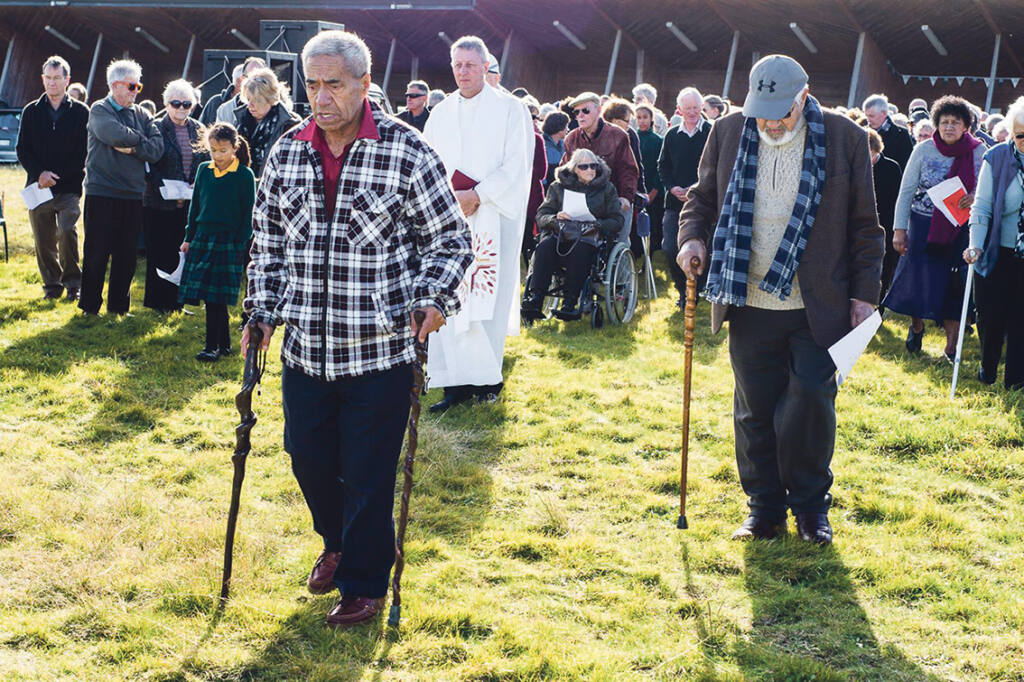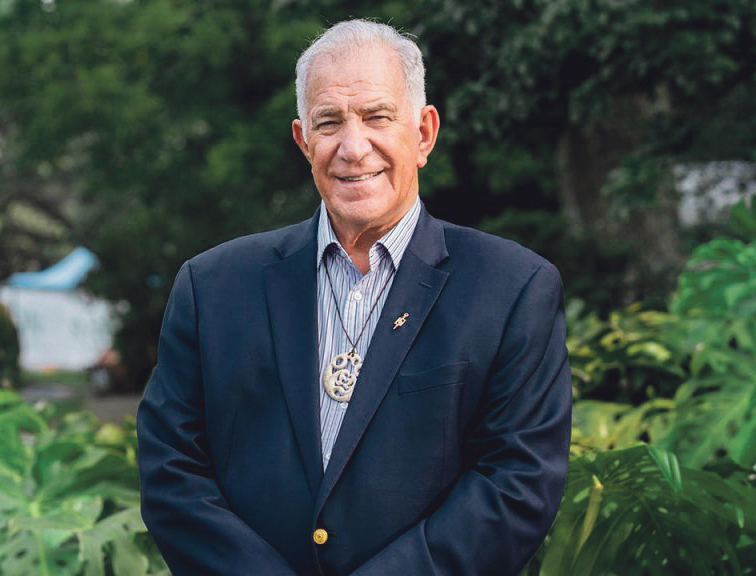WelCom February 2021

Photo: Bernie Velasco
Kaumatua farewelled
Archdiocesan Kaumatua Tuki Takiwa died peacefully on Friday 4 December 2020. He was in the presence of his wife of 61 years, Pauline, family and Fr Michael McCabe, for whom Tuki had called.
Tuki had filled a role as leader of prayer and blessing for the Archdiocese for many years, serving with Cardinal Tom Williams, Cardinal John Dew and his local parish in Paraparaumu, Our Lady of Kāpiti.
At numerous functions, it would be Tuki who would lead the prayer opening or closing of the event. One recent example is the blessing of the land where the new Te Whaea o Kāpiti, Our Lady of Kāpiti Church and complex is built. He and Pauline were also called on for blessings of both public and private sites in the Wellington region by Catholic and non-Catholic alike.
Tuki’s homeplace is Kākahi, a small town near Taumarunui. He returned there to be buried with his whānau.
Tuki met Pauline in a shearing shed at Taihape. They lived in various places including near Lake Taupō and in Wairoa before moving to the Kāpiti district, to Paraparaumu. Tuki worked in timber mills and Pauline was a local taxi driver.
While working, they regularly attended Mass, including the Miha Māori with Tuki acting as Catechist. This sustained the Miha Māori and, under Fr McCabe, renewed the Miha within the parish Mass.
Tuki lay first at home and then at Kāpiti College Marae. Many stories were recounted.
On Monday 7 December, a Requiem Mass was held at Our Lady of Kāpiti Church. Many kuia provided moving karanga to welcome Tuki and his whānau. Fr Michael McCabe led the Eucharist with Cardinal John concelebrating as did Mons Gerard Burns, Frs David Gledhill SM and Philip Cody SM (from Pukekaraka). Vicar for Māori, Deacon Danny Karatea-Goddard proclaimed the Gospel.
Lillian, Tuki’s eldest daughter gave a eulogy in which she described her father as ‘magnificent’. She, on behalf of the whānau, thanked him for his love and the experience of living as part of his family.
Fr Michael’s homily spoke of Tuki’s faith. ‘Tuki provided the bridge that we need to link things Māori and our faith. In this way, he helped us to appreciate the Treaty of Waitangi and made it real for us. He now leaves us to carry on the work of living out that ‘bridging’ for others.
On one occasion Tuki was approached by the liturgy group who had been accused of being paternal in leading Māori in the liturgy. Tuki quoted Lamentations (3:22f): ‘The steadfast love of the Lord never ceases; his mercies never come to an end they are new every morning…’. Tuki’s point was that in every pōwhiri, greeting or liturgical welcome, you look to the new. It is new every time. He implied, ‘Don’t even think of being paternal; this time is new’!
Cardinal John wore the korowai Tuki and Pauline had helped present to him at the time of his new appointment. He thanked Tuki for all his ministry in the Archdiocese and conducted the Final Farewell, sprinkling Tuki with kawakawa leaves.
Mons Gerard Burns, Deacon Danny Karatea-Goddard and his wife Maru accompanied Pauline and whānau to Taumarunui on the first part of Tuki’s return. A huge number of Ngāti Haua, Hikairo, Ngāti Te Maunga and local Ngāti Manunui people received Tuki and whānau. Maru returned the karanga of welcome from the Ngāpūwaiwaha and Te Taura Whiri o Hinengākau and Rangikapuia whare. Koro Don Te Maipi asked Danny and Ben Ngaia to speak on behalf of our tira. Two days later Tuki was buried at Kākahi. Noted kaumatua Uncle Alan Taumata was present in both Taumarunui and kākahi.
Mā ngā ringa aroha o Te Atua Tuki ki te kainga o te rangi e tango.
May God take Tuku in his hands within his heavenly home.
Sources: Mons Gerard Burns, Fr Michael McCabe, Fr Phil Cody SM, Deacon Danny Karatea-Goddard, Cardinal John Dew.
Remembering Dr Mānuka Henare
Mons Gerard Burns

Photo: The University of Auckland
Mānuka Henare (Ngāti Haua hapū of Te Aupōuri, Te Rarawa, Ngāti Kuri, Ngāti Kahu), founding director of Caritas Aotearoa New Zealand, adviser to the New Zealand Catholic Bishops Conference on Treaty issues, and highly-respected academic, passed away in Auckland on 23 January 2021, aged 78.
Mānuka had a tremendous impact on the Church in New Zealand during the 1980s, 1990s and into the 2000s and went on to the academic world, forming new generations of Māori leaders through his study and research.
Born in Auckland, Mānuka completed his schooling at St Paul’s College, Ponsonby. After school he began work labouring then at Winstones [construction materials’ company]. From there he became an extension worker for the Catholic Youth Movement around 1964–1965.
Subsequently Mānuka was employed by CORSO, bringing him to Wellington. A New Zealand organisation, CORSO was dedicated to overcoming poverty and its structural roots, especially in Asia and the South Pacific. His knowledge of the global dimensions of inequality, colonisation and racism grew. All this, plus a growing family, would not have been possible without the work and love of his wife Diane, an occupational therapist.
In the mid-1970s Mānuka was employed by the Catholic Overseas Aid committee in the Wellington Archdiocese. This led to the national roles as executive officer of the National Justice and Peace commission and then founding director of Caritas Aotearoa New Zealand. He advised on Māori issues for the 1988 Royal Commission into Social Policy.
Mānuka was involved in developing understanding in the Church of the Treaty of Waitangi, exploring Māori expressions of Catholicism, promoting inculturation and encouraging Māori leadership. When Pope St John Paul II came to New Zealand in 1986, Mānuka was the Pope’s principle guide. He often quoted Pope John Paul II’s words in Auckland, ‘It is as Māori that God calls you’.
Mānuka was also part of the delegation of Māori Catholics to Rome with Cardinal Williams to advocate for a Māori bishop. This bore fruit with the appointment of Bishop Takuira Mariu of Tuwharetoa in 1988 as the first Pihopa Katorika Māori– Māori Catholic Bishop.
In the late 1980s, as legal recognition of the Treaty of Waitangi grew, Mānuka was encouraged to study the Treaty. This would eventually lead to his academic career, initially at Victoria University, then in the business school at Auckland University and as founding director of the Dame Mira Szaszy Research Centre.
Mānuka’s 2003 PhD explored Māori economic development leading up to the Treaty including exploring Te Whakaputanga, the 1835 Declaration of Independence by Māori chiefs, the basis of the Treaty of Waitangi. Out of this came his work on the ‘unwritten 4th article’ of the treaty advocated for by Bishop Pompallier and accepted by Hobson at the Treaty signing. Mānuka was an authoritative witness at Waitangi Tribunal hearings showing that Māori did not cede sovereignty in the Treaty.
Mānuka became an ethno-historian of the confidence and entrepreneurial skills of Māori at the time of European contact in the 18th and 19th centuries and a proponent of Māori business development. He took a teaching role at Auckland University and a research role at the Dame Mira Szaszy Research Centre there. His research was painstaking, going to the sources, re-translating where necessary to depth original Māori terminology. His research and analysis of the confidence of Māori at the time of European contact led him to propose a distinctive Māori approach to business.
The late Pā Hēnare Tate, described Mānuka as the most eminent Māori Catholic scholar of our time.
Dr Mānuka Henare died following a short battle with a degenerative illness surrounded by his whānau. A widely respected and loved Rangatira he lay at Te Unga Waka Catholic marae in Auckland before being taken back for burial at Whangape on Tuesday 26 January for burial. A constant theme through the tangi was Mānuka’s encouragement of others.
Takoto mai, e te rangatira, i runga i te aroha o te Atua.